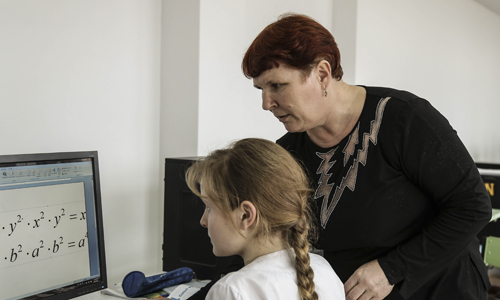Maia Porombrica: eTwinning, an incredible experience
Maia POROMBRICA
Teacher of mathematics/computer science, Lyceum ‚Mesterul Manole’, Salcuta, Causeni
Can you imagine a hall with 500 people from all over the world and at some point you hear someone screaming out: ‚ Maia Porombrica’?! It was an incredible experience for me. I could never imagine myself in Athens, the capital of Greece, together with representatives of the Ministries of Education from all over the world, with famous experts, with teachers like me. This happened two years ago at an eTwinning event.
I have been an eTwinner teacher for almost 5 years. I was the first eTwinner teacher from rural area in the Republic of Moldova. I heard about the platform from my Romanian colleague. Together, we thought about a joint project. We entitled it ‚Number Pi’ and it’s already the fifth year that we apply it our schools. But there was a problem at the time: she was registered on the eTwinning platform, and I wasn’t. Then I called Chisinau and insisted on being on the platform. Since then, we have done dozens of projects with schools from all around Europe. For example, pupils from Salcuta are currently participating in more than 20 eTwinning projects.
Returning to Athens, I’d like to say that it was an extraordinary professional and personal experience. The one who screamed out in the full hall was a teacher from Italy from the platform with whom we made four projects together, but whom I first met face to face in Athens. We recognized each other. And so we found more colleagues. At the eTwinning conference in Athens, we presented the project I mentioned above. What does the ‚Number Pi’ project mean? Thus, we intend to teach children through an interactive method that Pi is circle’s circumference divided by its diameter. How? Every year, on 14 March, on World Pi Day, the lyceum ‚Mesterul Manole’ celebrates this holiday. We draw, create, bake in the form of Pi number. In Athens, when I showed the pictures, everyone was surprised that we used dough, branches, and many other things to illustrate Pi.
I admit that I can’t speak English very well. And, in Athens, I learned by heart an eight-minute text. I started by saying that mathematical language is international one and can be understood by all the people. And there were many people in the hall who agreed with me that twice two is all four. But the language of communication is not an obstacle for eTwinner teachers. Most of the projects are written in English, but we also have projects in Georgian or Armenian. We translate them using Internet applications and we are successful in doing that.
eTwinning ensures personal and professional development of pupils as well as teachers. You cannot just confine yourself to the lessons. Coming out of our usual environment, pupils learn much more and much more eager. I watch the evolution of the pupils who graduated. They all write to me that they are part of various projects and travel a lot. There is a graduate pupil at the lyceum who liked the projects so much that thanks to her participation she has already been in six countries, including China.
To sum up, some say that it’s difficult to motivate a child to be more involved in subjects such as mathematics or computer science, but I’ll contradict them. I have pupils with special educational needs who were awarded eTwinning Prizes. There are so many ideas for mathematical projects that I’m afraid that my whole life will not be enough to implement them.







